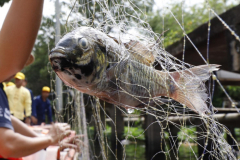A blackchin tilapia is entangled in a fishing net during a campaign to tackle this invasive species in tambon Plai Bang of Nonthaburi in September. (Photo: Pattarapong Chatpattarasill)
Environmental issues damaged Thai society and the economy in a number of ways in 2024.
1. Invasion of the alien fish
The year-end is just around the corner, but the authorities’ attempts to find those responsible for the massive spread of blackchin tilapia has yet to yield solid results.
For several months, this invasive species of alien fish has caused huge damage to Thailand’s economy and ecosystems.
The situation began to catch the public’s attention in July when many shrimp farmers in Samut Songkhram province reported a sudden decrease in their aquaculture and found the invasive fish in their farms.
They complained their farmed shrimp were being preyed upon by the fish, which they believed had been released negligently into public waterways.
Shortly after, problems regarding a drop in the local aquatic population due to the blackchin tilapia were reported in nearby provinces, especially along the Mae Klong River.
In August, the Fisheries Department declared 79 districts in 19 provinces as areas officially affected by the fish.
They comprised Chanthaburi, Rayong, Chachoengsao, Samut Prakan, Nonthaburi, Bangkok, Nakhon Pathom, Ratchaburi, Samut Sakhon, Samut Songkhram, Phetchaburi, Prachuap Khiri Khan, Chumphon, Surat Thani, Nakhon Si Thammarat, Songkhla, Chonburi, Phatthalung and Prachin Buri.
This raised strong concern among environmental activists and academics who fear the local freshwater ecological system is deteriorating due to the heavy loss of domestic aquatic animals.
The issue has led to a legal battle between BioThai, a non-governmental organisation, and CP Foods Plc (CPF), whose research centre conducted a project to breed the blackchin tilapia and was located in the area where the spread was first reported.
BioThai alleged the company was responsible and demanded compensation for the environmental damage.
The company denied the accusation, insisting that the fish, which were allegedly imported from Ghana for research in December 2010 with the permission of the Department of Fisheries, all died within a month of arrival.
As a result, the company suddenly terminated the project, it said, insisting that none of the 2,000 imported fish were released into outdoor environments.
The Ministry of Agriculture and Cooperatives refused to investigate further or provide information to the public, saying the case had already been sent to court.
Meanwhile, to eradicate the estimated three million kilogrammes of invasive fish species from the ecosystem, integrated efforts have been made by local communities and authorities.
They include biological control measures such as releasing predatory species into waterways in affected areas and programmes to encourage people to catch the fish for consumption as well as sell them to state officials so they can be turned into other products such as fish sauce and fertiliser.
2. Toxic waste sparks concerns
Damage is seen after a fire raged at a warehouse in Ban Khai district, Rayong, on April 22. Ecological Alert and Recovery-Thailand (EARTH)
A fire in an industrial waste warehouse owned by Win Process Company in Rayong’s Ban Khai district and the discovery of 15,000 tonnes of cadmium waste in Samut Songkhram, Bangkok and Chon Buri in April sparked public concern about hazardous waste management and poor law enforcement.
On April 22, the fire broke out, and explosions were heard in the lock-down facility of Win Process.
Local authorities ordered the evacuation of people in two nearby villages due to dangerous air quality caused by the chemicals. Win Process has been at loggerheads with locals for decades over the way it manages the business.
In 2022, the Rayong Provincial Court ordered the company to pay 20.82 million baht to compensate 15 residents affected by the plant’s activities. However, the company refused to pay, saying it had been declared bankrupt.
In September this year, the court ordered the company to pay 1.74 billion baht in compensation after finding the hazardous waste recycling company guilty of severely polluting the environment.
Further investigation found that the company might be linked to illegal hazardous waste management in Ayuthaya province.
Also in April, about 13,000 tonnes of cadmium tailings were found illegally stored in the J&B Metal smelting factory in Samut Sakhon, which prompted the provincial governor to declare the site and it
Read More





